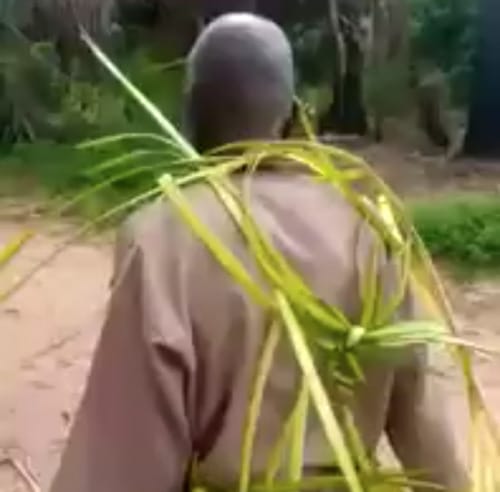By Leo Igwe
There is a link between disputes over land and allegations of perpetrating occult harm in Abia state in Southern Nigeria. This connection, reinforced whenever some misfortune befalls any of the parties, has amply been illustrated by the case of Obioma Ubani from Amuda Isuochi, a village in the northern central part of Abia state. In May, an advocate drew the attention of AfAW to the case of Mr. Ubani. He is in his 70s. His villagers banished him for killing a family member through witchcraft. Videos and photos of Mr. Ubani wearing some palm fronds, locally known as Omu, and being publicly disgraced and driven out of his community circulated on social media. In one of the videos, Obioma could be seen swearing and insisting on his innocence while a mob was charging and threatening to kill him if he returned to the village.
For some days, AfAW tried to reach Mr. Ubani without success. Calls were made to random numbers linked to persons and institutions in Amuda Isuochi and the surrounding villages. Some of the persons contacted said they did not know about the case. Whilst others said that they did not want to be associated with the issue. Luckily, somebody called back and provided the contact information of the wife, and the wife gave the contact of their son who is a pastor at a local church.
The son provided the contact of the father Mr. Ubani. Before she gave the contact of the son, the wife of Obioma recounted her side of the story. She was not at home when the husband was publicly accused, disgraced, and banished from their home. She went to the market. But on her return, she was told that her husband had been banished and that she should return to her paternal home because she was privy to the magical harm that the husband perpetrated. This accusation emotionally shattered Mrs. Ubani. Nonetheless, she left the community taking none of her belongings. She later sent some relatives to their family house and found out that the mob looted the house and made away with the palm oil that she stored for sale and other items. Also, all the chicken in her poultry had died because nobody fed or catered for them.

In recounting what happened, Mr. Ubani made it clear that his banishment was connected to a dispute over family land. The other party in the dispute was a younger family member that he helped train and support while he was in school. Mr. Obioma Ubani is the eldest in the family and the custodian of the family estate. A family member who was lecturing at a university wanted to build a house and asked Obioma to show him a piece of land where he could erect his building. Obioma told him to have some patience. While he was trying to decide which piece of land to give him, this lecturer went and started building on a piece of land which Obioma said belonged to him. Obioma went and put some Omu on the land. According to Mr. Ubani, placing palm fronds on the land (Igba Omu) was to tell this family member to cease further action until the matter was resolved. This relative reported the case to the village council. Obioma Ubani was asked to remove the Omu. He told the village council that he placed the Omu because he would not stand by and watch this relative take over his land. He went ahead and removed the Omu from the land. That was in December last year.
In May, some community members invited him to a meeting. They informed him that this relative had died and that he was responsible for the death. No medical autopsy was carried out to ascertain the cause of death. Community members based their decision on the fact that Mr. Obioma Ubani placed Omu on the disputed land. That Obioma declared that he won’t live to see the late relative build on the land. Obioma said that the community members misquoted him; they twisted what he said to suit their intent to hold him responsible for the death of this relative. The village mob eventually drove me out; they placed Omu on him booing as he left the community. Some of those who facilitated the mob action include Tony Igwe, Monday Ihegazie, Okechukwu Oguesie, Uchenna Offor, Uchenna Obi, Ignatius Okereke, and others. Following his expulsion from the community, Mr. Ubani has been living with his family members in Enugu.
Family members informed the traditional ruler of the community, Eze Okechukwu Chukwuji, the Logo of Amuda Isuochi, about the incident. Eze Chukwuji was unhappy with the allegation and banishment of Mr. Ubani. He promised to look into the case. Obioma’s family also reported the case to the police at Zone 9, Umuahia. AfAW contacted the police officer assigned to investigate the case. And she confirmed that the investigation was ongoing. AfAW will monitor the process of investigation to ensure that the police do not compromise the case. Witch persecution and mistreatment of alleged witches continue to take place because the police are pressured and bribed to abandon reported cases. The police are unable to investigate and prosecute perpetrators. AfAW will work and campaign to educate and enlighten the people of Amuda Isuochi to know that allegations of witchcraft are baseless, and the banishment of Mr. Ubani violated the law and human rights. AfAW will strive to reason the accusers out of their ignorance, occult fears and anxieties including their mistaken ideas and assumptions about the cause of death, diseases and other misfortunes. AfAW will ensure that those who were behind the persecution and banishment of Mr. Ubani are brought to justice.
